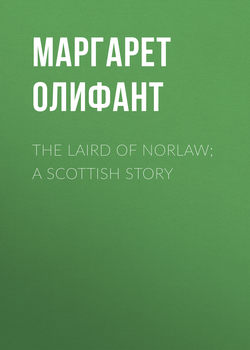The Laird of Norlaw; A Scottish Story

Реклама. ООО «ЛитРес», ИНН: 7719571260.
Оглавление
Маргарет Олифант. The Laird of Norlaw; A Scottish Story
CHAPTER I
CHAPTER II
CHAPTER III
CHAPTER IV
CHAPTER V
CHAPTER VI
CHAPTER VII
CHAPTER VIII
CHAPTER IX
CHAPTER X
CHAPTER XI
CHAPTER XII
CHAPTER XIII
CHAPTER XIV
CHAPTER XV
CHAPTER XVI
CHAPTER XVII
CHAPTER XVIII
CHAPTER XIX
CHAPTER XX
CHAPTER XXI
CHAPTER XXII
CHAPTER XXIII
CHAPTER XXIV
CHAPTER XXV
CHAPTER XXVI
CHAPTER XXVII
CHAPTER XXVIII
CHAPTER XXIX
CHAPTER XXX
CHAPTER XXXI
CHAPTER XXXII
CHAPTER XXXIII
CHAPTER XXXIV
CHAPTER XXXV
CHAPTER XXXVI
CHAPTER XXXVII
CHAPTER XXXVIII
CHAPTER XXXIX
CHAPTER XL
CHAPTER XLI
CHAPTER XLII
CHAPTER XLIII
CHAPTER XLIV
CHAPTER XLV
CHAPTER XLVI
CHAPTER XLVII
CHAPTER XLVIII
CHAPTER XLIX
CHAPTER L
CHAPTER LI
CHAPTER LII
CHAPTER LIII
CHAPTER LIV
CHAPTER LV
CHAPTER LVI
CHAPTER LVII
CHAPTER LVIII
CHAPTER LIX
CHAPTER LX
CHAPTER LXI
CHAPTER LXII
CHAPTER LXIII
CHAPTER LXIV
CHAPTER LXV
CHAPTER LXVI
CHAPTER LXVII
CHAPTER LXVIII
CHAPTER LXIX
CHAPTER LXX
CHAPTER LXXI
CHAPTER LXXII
CHAPTER LXXIII
CHAPTER LXXIV
CHAPTER LXXV
CHAPTER LXXVI
Отрывок из книги
Half a mile below Norlaw, “as Tyne runs,” stood the village of Kirkbride. Tyne was but one of the many undistinguished Tynes which water the south of Scotland and the north of England, a clear trout stream, rapid and brown, and lively, with linns and pools, and bits of woodland belonging to it, which the biggest brother of its name could not excel; and Kirkbride also was but one of a host of Kirkbrides, which preserved through the country, long after every stone of it had mouldered, the name of some little chapel raised to St. Bridget. This was an irregular hamlet, straggling over two mounds of rising ground, between which Tyne had been pleased to make a way for himself. The morsel of village street was on one bank of the water, a row of irregular houses, in the midst of which flourished two shops; while at the south end, as it was called, a little inn projected across the road, giving, with this corner, and the open space which it sheltered, an air of village coziness to the place which its size scarcely warranted. The other bank of the water was well covered with trees—drooping birches and alders, not too heavy in their foliage to hide the half dozen cottages which stood at different elevations on the ascending road, nor to vail at the summit the great jargonel pear-tree on the gable wall of the manse, which dwelt upon that height, looking down paternally and with authority upon the houses of the village. The church was further back, and partially hidden by trees, which, seeing this edifice was in the prevailing fashion of rural Scottish churches—a square barn with a little steeple stuck upon it—was all the better for the landscape. A spire never comes amiss at a little distance, when Nature has fair play and trees enough—and the hillock, with its foliage and its cottages, its cozy manse and spire among the trees, filled with thoughts of rural felicity the stray anglers who came now and then to fish in Tyne and consume the produce of their labor in the gable parlor of the Norlaw Arms.
The doctor had just passed through the village. On his way he had been assailed by more than one inquiry. The sympathy of the hamlet was strong, and its curiosity neighborly,—and more than one woman retired into her cottage, shaking her head over the news she received.
.....
Huntley, whose arm still rested on the boy’s shoulder, drew him closer, with a look which had caught a tender, sympathetic, half-compassionate enthusiasm from his.
“We’ll save Norlaw for my father’s son,” said the elder brother; and, young as Huntley was, he looked with eyes full of love and pity upon this boy, who inherited more from his father than his name. Huntley had been brought up in all the natural love and reverence of a well-ordered family; he knew there was weakness in his father’s character, beautiful, lovable, tender weakness, for which, somehow, people only seem to like him better. He had not permitted himself to see yet what harm and selfish unconsciousness of others that graceful temperament had hidden. He looked at Cosmo, thinking as a strong mind thinks of that constitution which is called poetic—of the sensitive nature which would shrink from unkindness, and the tender spirit which could not bear the trials of the world; and the lad’s heart expanded over his father’s son.
.....